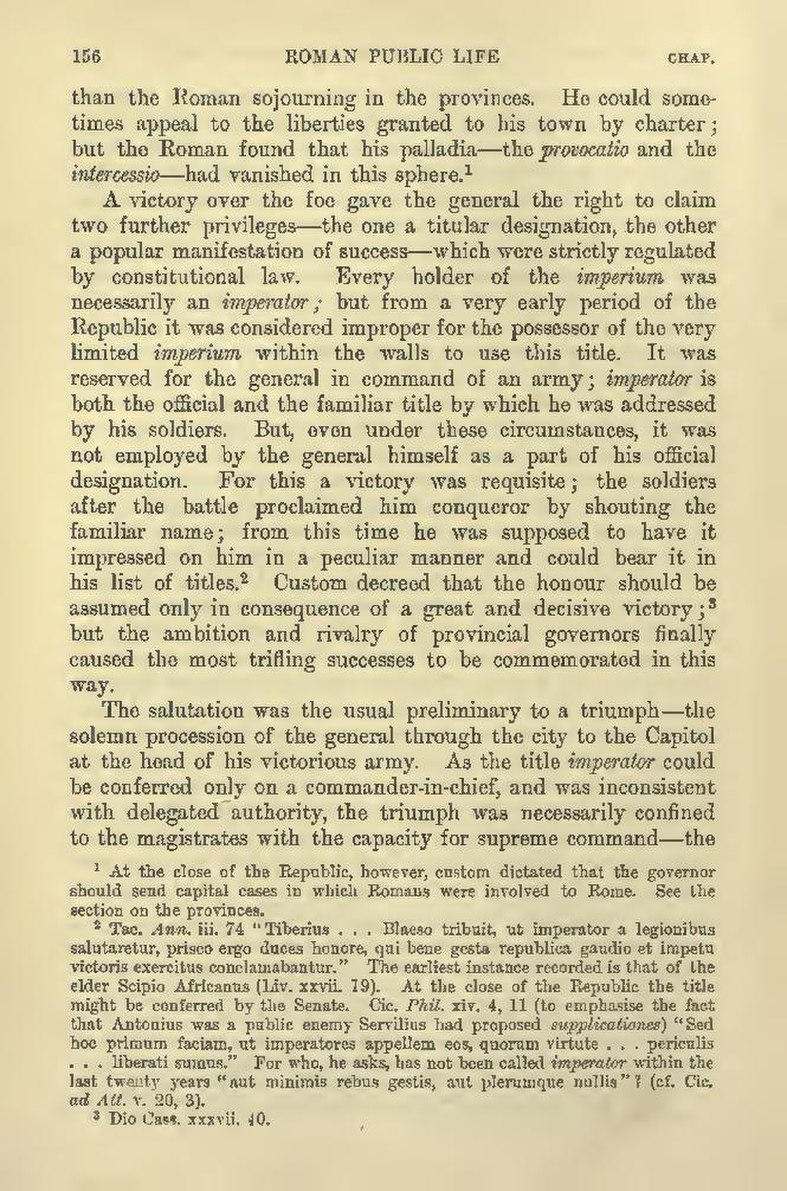than the Roman sojourning in the provinces. He could sometimes appeal to the liberties granted to his town by charter; but the Roman found that his palladia—the provocatio and the intercessio—had vanished in this sphere.[1]
A victory over the foe gave the general the right to claim two further privileges—the one a titular designation, the other a popular manifestation of success—which were strictly regulated by constitutional law. Every holder of the imperium was necessarily an imperator; but from a very early period of the Republic it was considered improper for the possessor of the very limited imperium within the walls to use this title. It was reserved for the general in command of an army; imperator is both the official and the familiar title by which he was addressed by his soldiers. But, even under these circumstances, it was not employed by the general himself as a part of his official designation. For this a victory was requisite; the soldiers after the battle proclaimed him conqueror by shouting the familiar name; from this time he was supposed to have it impressed on him in a peculiar manner and could bear it in his list of titles.[2] Custom decreed that the honour should be assumed only in consequence of a great and decisive victory;[3] but the ambition and rivalry of provincial governors finally caused the most trifling successes to be commemorated in this way.
The salutation was the usual preliminary to a triumph—the solemn procession of the general through the city to the Capitol at the head of his victorious army. As the title imperator could be conferred only on a commander-in-chief, and was inconsistent with delegated authority, the triumph was necessarily confined to the magistrates with the capacity for supreme command—the
- ↑ At the close of the Republic, however, custom dictated that the governor should send capital cases in which Romans were involved to Rome. See the section on the provinces.
- ↑ Tac. Ann. iii. 74 "Tiberius . . . Blaeso tribuit, ut imperator a legionibus salutaretur, prisco ergo duces honore, qui bene gesta republica gaudio et impetu victoris exercitus conclamabantur." The earliest instance recorded is that of the elder Scipio Africanus (Liv. xxvii. 19). At the close of the Republic the title might be conferred by the Senate. Cic. Phil. xiv. 4, 11 (to emphasise the fact that Antonius was a public enemy Servilius had proposed supplicationes) "Sed hoc primum faciam, ut imperatores appellem eos, quorum virtute . . . periculis . . . liberati sumus." For who, he asks, has not been called imperator within the last twenty years "aut minimis rebus gestis, aut plerumque nullis"? (cf. Cic. ad Att. v. 20, 3).
- ↑ Dio Cass. xxxvii. 40.
